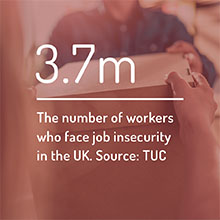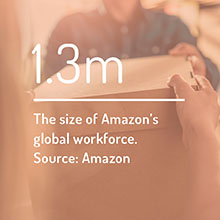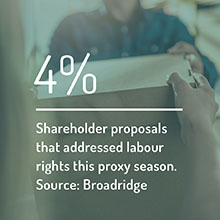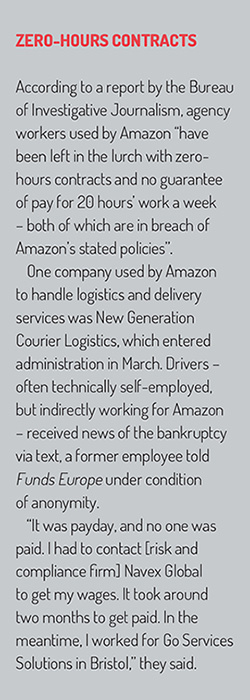Despite an increased focus on the ‘social’ side of ESG, many fund managers seem reluctant to side with disgruntled staff at companies such as Amazon, where labour-related controversies are commonplace. Alex Rolandi reports.
“It takes a lot of courage to divest from Amazon; it’s such a lucrative stock,” says Roxana Dobre, associate director, consumer goods research at data provider Sustainalytics.
In 2020 alone – a record year for the e-commerce giant – annual revenue increased by nearly 40% year-on-year to $386 billion (€329 billion), while net profits soared by 84%.
Since its initial public offering in 1997, the business has generated a lot of wealth for investors, as Jeff Bezos pointed out in his final letter to shareholders as CEO. At the time of writing this article, Amazon’s market cap stood at around $1.6 trillion. Allegations of poor working conditions are ongoing.
The vast majority of the multinational’s labour issues, highlights Dobre, are found in its warehouses. “The difference between the blue and white-collar employees at Amazon is quite big,” she says.
Research by MSCI shows that Amazon is in the top ten common holdings for the consumer discretionary sector within the world’s 20 largest ESG funds, with an average weighting of 4.43%.
Among its biggest stakeholders are the likes of Vanguard and BlackRock, neither of which was available to comment directly on the issue.
No stranger to controversy
Sustainalytics has classified Amazon as a high ESG risk. Among the primary factors contributing to its ‘controversy level’ are labour relations, human rights issues, accounting and taxation, as well as anti-competitive practices.
“When it comes to its own operations, the fact that workers need to do a lot of overtime and are not being paid fair minimum wages is problematic,” says Dobre.
“On top of that, Amazon has had allegations of enforced child labour in China,” she adds, noting that these were in conjunction with Taiwan-headquartered tech manufacturer Foxconn. A supplier to both Amazon and Apple, Foxconn admitted to child labour infringements in its workforce nearly a decade ago and has seen numerous controversies since.
Amazon has also been accused of benefiting from the use of forced labour among China’s ethnic Uighur population alongside 82 other major brands, including Google, Nike, Apple and Tesla.
“Here, these accusations were closer to home because the workers were active in factories that were direct suppliers to Amazon,” Dobre explains.
“Handling human rights-related issues in the supply chain is relatively new for Amazon, unlike for an apparel company which constantly deals with them. It will take some time before they understand that they also have a moral responsibility there.” The company has since stated that it does not tolerate forced labour.
The corporation – which employs about 1.3 million people worldwide – also continues to deny the existence of so-called ‘zero-hour’ contracts in its UK workforce, despite evidence to the contrary. The Seattle-headquartered firm was not available to comment on labour issues before publication, but a spokesperson told Funds Europe that it values corporate governance and engagement.
 In the UK, an estimated 3.7 million workers face job insecurity because their contracts don’t guarantee regular hours or pay, according to research by the Trades Union Congress (TUC). These include people in zero-hours contracts, agency work and casual work.
In the UK, an estimated 3.7 million workers face job insecurity because their contracts don’t guarantee regular hours or pay, according to research by the Trades Union Congress (TUC). These include people in zero-hours contracts, agency work and casual work.
Rachel Hargreaves, senior project officer at campaign group ShareAction, says: “Covid-19 has both highlighted and exacerbated the challenges experienced by low-paid and insecure workers across the globe.
“The pandemic has brought the ‘S’ in ESG, in particular labour rights, to the attention of investors like never before and as a result, we have seen an increased number of investors making statements regarding labour rights.”
One notable moment came this year during the IPO of online food delivery company Deliveroo, says Hargreaves. Eleven institutional investors – including Aviva Investors and M&G – took the “unusual” step of making public statements that they would not be investing in the company, citing concerns over the treatment of its riders.
Shareholder responsibility
“The challenges and poor working conditions experienced by Amazon’s workforce have been well documented for years,” says Hargreaves. “Any investor that claims to have an ESG focus simply must engage on these issues and endeavour to drive change.”
Some investors have been taking action, she notes. These include the New York City Pension Funds and Dutch asset manager APG, which have a combined $4.2 billion invested in Amazon. Early in the pandemic, they wrote to the board regarding health-and-safety concerns raised by workers.
Ahead of Amazon’s annual general meeting, held virtually in May, the Oxfam charity filed a proposal calling on it to put an hourly-paid employee from its workforce on the board of directors. It garnered 17.5% of the total vote.
Meanwhile, German asset manager DWS highlighted how labour-related controversies have intensified during the pandemic with cases of alleged poor working conditions, and unfair dismissal of employees for protests, as well as inadequate safety measures.
 In a letter to Bezos and the board, DWS – which has declined to reveal the size of its stake in the company – asked Amazon what further measures it intends to take to prevent labour controversies going forward.
In a letter to Bezos and the board, DWS – which has declined to reveal the size of its stake in the company – asked Amazon what further measures it intends to take to prevent labour controversies going forward.
According to Nezhla Mehmed, research analyst, responsible investments at DWS, it is crucial to establish formal responsibility at board level.
“The complexity of the modern-day supply chain means that a variety of risks can be embedded in the business without management’s knowledge,” she tells Funds Europe. “The pandemic has provided new insights into the supply network. It revealed an unsettling lack of full visibility into value chains and exposed weaknesses and gaps between first-tier and lower-tier suppliers.”
During this year’s proxy voting season, proposals related to labour rights and human capital issues made up around 4% of the overall total, according to tech and data firm Broadridge.
At Amazon’s AGM, shareholders voted down 11 proposals largely aimed at making the company more transparent and responsible, addressing issues such as working conditions, climate change, and diversity.
The only proposal that received a majority vote in favour was put forward by management and related to executive compensation. It won more than 80% of the vote, according to Proxy Monitor.
‘Social-washing’
A report published last year by ShareAction accused the majority of the world’s largest asset managers of “paying lip service” to human rights issues, with few taking “meaningful” action.
Another study by the group found that just 15 out of 102 ESG resolutions received majority support in 2019/20. The world’s two largest fund managers, BlackRock and Vanguard, voted for just 12% and 14% of proposals respectively, ShareAction said.
“In many cases, asset managers are voting down resolutions that would improve labour rights in organisations, and it’s not always clear what mandate they have to do that,” says Alice Martin, labour specialist at Pensions & Investment Research Consultants (Pirc). “Those resolutions are often filed by the workforces, and they’re just asking for a seat on the board. Asset managers seem to be getting in the way of that, which tells a lot about what their intentions really are.”
Several asset managers have since pledged to improve their voting performance. In December 2020, for example, BlackRock announced a new voting policy said to support more shareholder resolutions on climate and social issues.
At Amazon’s 2021 AGM, BlackRock voted for all management proposals but also for one of the shareholder proposals seeking a civil rights, equity, diversity and inclusion audit. More broadly, the US fund manager – which has nearly $9.5 trillion assets under management – recently published its latest voting record for 2020-2021 and it shows that this year BlackRock Investment Stewardship (BIS) supported 35 out of 100 social-related shareholder proposals, compared to eight out of 114 supported in the 2019-20 proxy year. BIS voted against management over social issues at 36 companies, including voting against director re-elections at Oracle Corporation, Sketchers USA and Top Glove in Asia-Pacific.

No disclosure
When it comes to issues such as carbon use and water scarcity, plenty of metrics are available to hold companies to account. This is not the case for workers’ rights, however.
“In the UK and US, there’s very poor regulation on what companies have to disclose,” says Martin.
So, how can companies like Amazon be expected to improve working conditions in their value chains when, in many cases, they refuse to acknowledge any discrepancies in the first place?
According to Martin, investors have an important role to play in pushing for improved disclosure – “because once you have the data, it becomes much harder to deny”. At the same time, she adds, companies with more egregious practices are less likely to be transparent or willing to push for greater disclosure regarding labour rights.
For DWS, a focus on transparency and disclosure comes before anything else, according to Mehmed. “Without the data, it’s extremely difficult to judge. It can be your word against the company, and they say they’re not engaging in controversial activities. This happens across sectors,” she says.
If a company is committed to disclosing more details of its headcount payment structure, for example, analysts and portfolio managers are better placed to judge how much of that is being paid into minimum or working wages, the analyst explains.
When asked how managers can justify the inclusion of poorly rated companies in ESG funds, she argues that being invested is the best way to put pressure on firms.
As ShareAction’s Hargreaves also points out, failing to engage effectively on labour issues poses risks for investors. “Businesses that continually disregard their workers are subject to poor reputations, increased risk of industrial action and regulatory action,” she says.
When all else fails…
In July last year, Aberdeen Standard dumped shares in fast-fashion retailer Boohoo, saying the company’s response to poor working conditions in its supply chain was inadequate.
 “Obviously it’s a positive thing to divest, but it felt like a knee-jerk reaction to try and avoid reputational harm,” says Pirc’s Martin. “If you actually look in their reporting prior to the divestment, prior to Boohoo being exposed, Aberdeen Standard were praising them for their labour practices.”
“Obviously it’s a positive thing to divest, but it felt like a knee-jerk reaction to try and avoid reputational harm,” says Pirc’s Martin. “If you actually look in their reporting prior to the divestment, prior to Boohoo being exposed, Aberdeen Standard were praising them for their labour practices.”
Earlier in 2021, Schroders discreetly removed Amazon from an ESG fund, encouraged by UK-based foundation-sector shareholders, according to a report by Pirc.
Friends Provident Foundation, Joffe Trust and the Blagrave Trust pointed out to its wealth management arm Cazenove Capital that labour practices at Amazon weren’t up to scratch and it shouldn’t be in a sustainable fund, Martin explains. “That was quite a positive example.”
Divestment, though a necessary component in escalation strategies, is a last resort. It sends a message, but also relinquishes stakeholder influence. Generally, investors prefer engagement.
Raising issues at board level is only the halfway point of the process, says DWS’s head of ESG integration, Susana Peñarrubia. “You cannot change a company overnight, but you need to see the signals,” she says.
Ideally, the world’s largest employers should be leading by example. But they aren’t, so it’s up to shareholders to hold them accountable. If companies don’t respond to engagement after a set amount of time, fund managers need to react. Failure to do so may put their own ESG credentials into question and leave them exposed to social-washing allegations.
© 2021 funds europe





